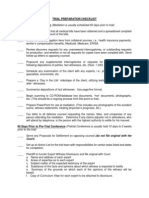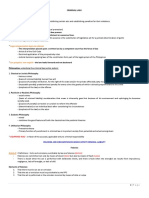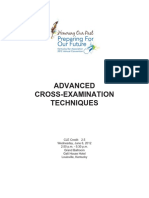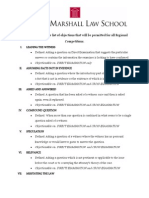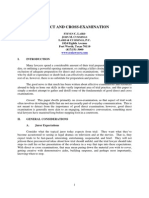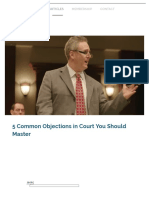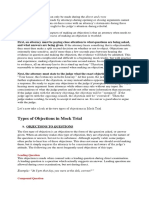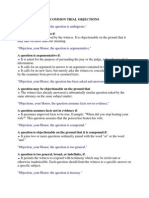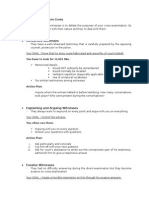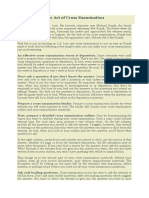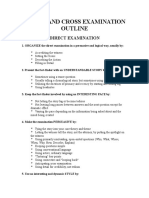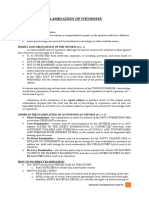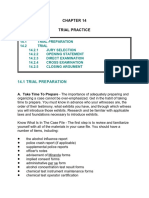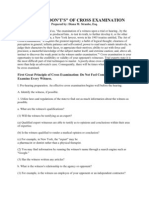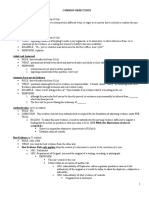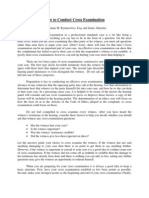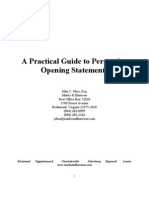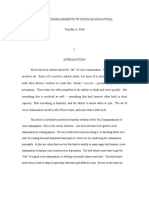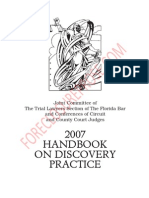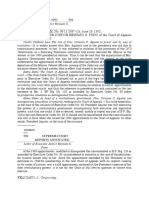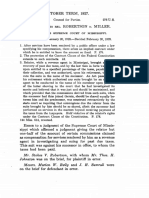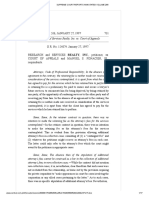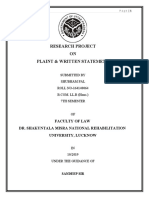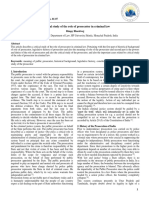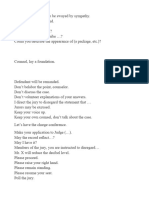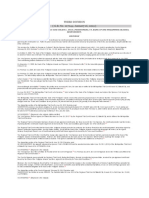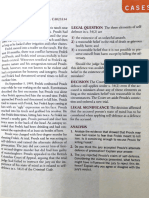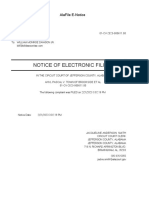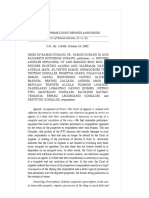Litigation and Trial Practice
Litigation and Trial Practice
Uploaded by
France De LunaCopyright:
Available Formats
Litigation and Trial Practice
Litigation and Trial Practice
Uploaded by
France De LunaOriginal Description:
Copyright
Available Formats
Share this document
Did you find this document useful?
Is this content inappropriate?
Copyright:
Available Formats
Litigation and Trial Practice
Litigation and Trial Practice
Uploaded by
France De LunaCopyright:
Available Formats
LITIGATION AND TRIAL
PRACTICE
Introduction to Law and
Jurisprudence
03 October 2014
LITIGATION AND TRIAL
PRACTICE
DEFINITION OF TERMS
Litigation (n.) is the process of taking a case
through court. It is a contest in court for the
purpose of enforcing a right or seeking a
remedy. In litigation, there is a
plaintiff/prosecution (one who brings the
charge) and a defendant/accused (one
against whom the charge is brought). To
litigate is to file a charge against someone
and bring a case to court
LITIGATION AND TRIAL
PRACTICE
Trial practice
Trial is a judicial examination and
determination of issues between parties to
action, whether they be issues of law or
fact, before a court that has the proper
jurisdiction. Trial practice therefore refers
to the actual engagement of a lawyer in the
trial stage of the litigation
LITIGATION AND TRIAL
PRACTICE
In the Philippines, becoming a lawyer is
normally associated with court actions.
People view a lawyer as someone who
handles cases being tried in court, actually
appears before courts as counsel to a party
and conducts trial practice with the
objective to win a particular case.
LITIGATION AND TRIAL
PRACTICE
OBJECTIVES:
To have an overview on the basic
practices and conduct of a lawyer of during
the hearing of the case in preparation to
the moot court exercise.
To be able to know the fundamentals of
evidence presentation and trial processes
LITIGATION AND TRIAL
PRACTICE
JUDGE ENTERS THE COURT ROOM
It is important that the lawyer must be on
the court room for the hearing of the case
before the judge arrives. A lawyer may be
fined for arriving late.
LITIGATION AND TRIAL
PRACTICE
JUDGE ENTERS THE COURT ROOM
Everyone in the court room must stand up.
The Clerk of Court will then say the following
All rise, the Honorable ___________ ,
presiding judge of Regional Trial Court
____, has arrived, silence is hereby
enjoined.
Once the Judge hits the gavel, that is the only
time that everyone can be seated
LITIGATION AND TRIAL
PRACTICE
The Judge will then instruct the reading of
the case. Wait until your case is called.
Once your case is read from the calendar
of the court, you must stand up in order
that the court will recognized you
LITIGATION AND TRIAL
PRACTICE
ENTERING THE LAWYERS APPEARANCE
The purpose is to have your appearance be
placed on records.
Good morning your Honor, Atty. (your
name), respectfully appearing as counsel
for the (party you are representing)
LITIGATION AND TRIAL
PRACTICE
ADDRESSING THE COURT
Always address the judge as Your Honor .
Do not interrupt while the judge is still
speaking. If you wanted to say anything to the
court about a matter not being asked or you
want to comment on any statement made by
the adverse counsel, seek the permission of
the court by saying Your Honor, please...
then proceed with your statement
LITIGATION AND TRIAL
PRACTICE
PRESENTATION OF EVIDENCE
When your case is set for trial, the court
will ask you if you are ready with the
presentation of your evidence. Just say
ready and then proceed to call your
witness on the witness stand
LITIGATION AND TRIAL
PRACTICE
PRESENTATION OF EVIDENCE
Once in the witness stand, the witness will
be sworn in before testifying
Do you swear to tell the whole truth and
nothing but the truth before this
Honorable Court so help you God?
LITIGATION AND TRIAL
PRACTICE
PRESENTATION OF EVIDENCE
The clerk will then ask the witness
regarding his/her personal circumstances
(name, age, address, work, work place).
These will again be read to the Court
LITIGATION AND TRIAL
PRACTICE
PRESENTATION OF EVIDENCE
Offer the testimony of the witness
(TESTIMONIAL EVIDENCE) at this point
state to the court the matters that the
testimony of the witness will be proving
Your Honor, we are offering the testimony of
the witness to prove the following... With
the permission of this Honorable Court
LITIGATION AND TRIAL
PRACTICE
PRESENTATION OF EVIDENCE
The judge will then ask the opposing
counsel to comment on the offer made. If
no comment , the lawyer will just say
Subject to cross examination, your
Honor The judge will then instruct you to
proceed with the presentation of the
witness.
LITIGATION AND TRIAL
PRACTICE
DIRECT EXAMINATION
- taking of the oral testimony of the
witness in open court under oath or
affirmation, on matters which are within
his personal knowledge or competence
and are relevant to the issues involved in
the litigation, with the end in view of
building up the case theory of the party in
whose behalf he takes the witness stand.
LITIGATION AND TRIAL
PRACTICE
DIRECT EXAMINATION
1. You cannot ask leading questions except on
preliminaries
2. The witness must always address you as sir or
maam
3. Be methodical
4. Lay the foundation (setting the background)
5. Questions must be broad avoid specific
questions , be sure that the answer to the
question will enable the witness to narrate e.g.
What happened next, if any?, What did you do
after that, if any?.
LITIGATION AND TRIAL
PRACTICE
DIRECT EXAMINATION
Be sure that documentary evidence are identified
Do you have a copy of that promissory note
(witness is handing to me a copy of the
promissory note date..... or I am showing to
you a copy of the promissory note dated....
Kindly identify if this is the promissory note you
are referring to.. Have it marked afterwards
Your Honor please, may I request that this
promissory note identified by the witness be
marked as Exhibit....
LITIGATION AND TRIAL
PRACTICE
DIRECT EXAMINATION
If the witness is an expert witness, be sure to
qualify first before proceeding with the
testimony, unless the opposing counsel
agrees to stipulate on the qualification of the
witness. As a rule, a witness cannot give out
opinions as part of the testimony except those
regarding the identity, handwriting, mental
sanity, impressions of the emotion,
behaviour, condition or appearance of a
person whom he has adequate knowledge.
Another exception is the testimony of an
expert witness.
LITIGATION AND TRIAL
PRACTICE
DIRECT EXAMINATION
Once your through asking the witness, say
That would be all for the witness your
Honor, then cross-examination will
follow.
LITIGATION AND TRIAL
PRACTICE
CROSS EXAMINATION
- Is the interrogation of the witness upon a trial
or a hearing by the party opposed to the one
who produced him. The object of the cross
examination is to weaken or disprove the case
of ones adversary, and break down his
testimony in chief, test the recollection,
veracity, accuracy, honesty, and bias or
prejudice of the witness, his source of
information, his motives, interest and
memory and exhibit the improbabilities of his
testimony (98 CJS 126)
LITIGATION AND TRIAL
PRACTICE
CROSS EXAMINATION
1. Determine the necessity of cross-examination and do not cross
just for the sake of doing it. Analyze carefully the testimony
on direct before formulating questions for the cross-
examination
2. Always cross examine to the main point. Avoid repetitions. Do
not give the witness a chance to explain or clarify a
contradicting or vague testimony he made on direct
3. Observe courtesy and respect
4. Leading questions are allowed. However, refrain from
misleading questions
5. Never argue with the witness
6. Ideally, questions should call only for a yes or no
answer
LITIGATION AND TRIAL
PRACTICE
RE-EXAMINATION OF THE WITNESS
You may conduct a re-direct and re-cross
examination, whichever is applicable, and
the necessity of the same will be a case to
case basis. Normally, a lawyer conducts a
re-direct or re-cross for matters covered
during direct and cross or relevant to the
same, and those matters must be clarified
LITIGATION AND TRIAL
PRACTICE
CLARIFICATORY QUESTIONS
The judge, on his discretion, may conduct
clarificatory questions towards the witness
and is not subject to the usual restrictions
when the witness is presented on direct or on
cross. Clarificatory questions serves as an aid
for the judge to extract facts that will aid him
in deciding the case that were not asked
during direct or cross
LITIGATION AND TRIAL
PRACTICE
OFFER OF DOCUMENTARY EXHIBITS
Once the testimony of the witness is concluded and
you are already resting your case with respect to the
presentation of the evidence, documentary exhibits
must be formally offered to be admitted by the court.
You Honor, we are formally offering the following
documentary exhibits for the admission of this
Honorable Court:
Exhibit A Promissory Note dated 16 September 2009
to prove that defendant secured a loan from the
plaintiff
LITIGATION AND TRIAL
PRACTICE
OBJECTIONS
Objection during the testimony of the
witness must be raised as soon as the
cause for the same becomes apparent.
Objection to the documentary evidence
must be made after the same is offered.
LITIGATION AND TRIAL
PRACTICE
GROUNDS FOR OBJECTION
Testimonial Evidence:
Leading questions (on direct)
Misleading questions (on cross)
Opinion (with exceptions)
Vague, indefinite, uncertain questions
Argumentative questions
Competency and relevancy
Hearsay
No Basis
Repeatedly asking the same question when it was already
answered (on cross)
Questions containing more than one proposition
LITIGATION AND TRIAL
PRACTICE
GROUNDS FOR OBJECTION
Documentary evidence:
Admissibility
Genuineness, due execution, truthfulness
Relevancy and materiality
Best Evidence Rule
Parole Evidence
Failure to identify during trial
LITIGATION AND TRIAL
PRACTICE
OBJECT EVIDENCE
RULE 130, Section 1 Object as evidence
are those addressed to the senses of the
court. When an object is relevant to the
fact in issue, it may be exhibited to,
examined or viewed by the court.
LITIGATION AND TRIAL
PRACTICE
ADDITIONAL TIPS:
When arguing about a specific matter, always
address your concern to the court. Be
courteous to your opponent. Avoid name
calling or any other form of character
assassination against the adverse counsel.
Be gentle in the manner you make your point.
Do not shout or curse your opponent. Finally,
whenever a judge makes a ruling over an
issue brought before it in open court, either
you submit to it or inform the court that you
intend to appeal the subject ruling but never
argue with the judge.
LITIGATION AND TRIAL
PRACTICE
END OF COURT SESSION
All must stand up once the hearing is
concluded and the judge is about to leave
the court room. If other cases are still to be
heard, ask permission from the court
before leaving Permission to leave your
Honor
LITIGATION AND TRIAL
PRACTICE
MATTHEW 5:25
Make friends quickly with your opponent at
law while you are with him on the way, so
that your opponent may not hand you over
to the judge, and the judge to the officer,
and you be thrown into prison.
You might also like
- Trial Preparation ChecklistDocument4 pagesTrial Preparation ChecklistSami Hartsfield100% (6)
- Criminal Law Book 1 Reviewer For ReyesDocument47 pagesCriminal Law Book 1 Reviewer For ReyesFrance De Luna80% (10)
- AGENCY and TRUST 2022-2023Document6 pagesAGENCY and TRUST 2022-2023Gabriel HernandezNo ratings yet
- Poznar & DoddDocument56 pagesPoznar & Doddmirmoinul100% (5)
- The Art of Cross Examination PDFDocument15 pagesThe Art of Cross Examination PDFmithun7100% (4)
- 2013 Objections - Trial TechniquesDocument4 pages2013 Objections - Trial TechniquesJayson Jay Parra Ison100% (6)
- Trial Techniques, Preparation & PracticeDocument32 pagesTrial Techniques, Preparation & Practicelucasferna123No ratings yet
- Diokno Notes of TrialDocument16 pagesDiokno Notes of TrialIsidore Tarol III80% (10)
- THE FIRM IBP CEBU CITY. Effective Trial Advocacy Lecture Notes by Rogelio VinluanDocument29 pagesTHE FIRM IBP CEBU CITY. Effective Trial Advocacy Lecture Notes by Rogelio Vinluanhypestreet mafiaNo ratings yet
- Trial Objections From Beginning To End - The Handbook For Civil AnDocument77 pagesTrial Objections From Beginning To End - The Handbook For Civil AnPinoySavant100% (6)
- List of Objections - T. Mauet, Fundamentals of Trial TechniquesDocument1 pageList of Objections - T. Mauet, Fundamentals of Trial Techniquestristan100% (3)
- Trial TechniqueDocument7 pagesTrial TechniqueNash Ortiz Luis100% (1)
- Direct Examination The Art of Communication PDFDocument14 pagesDirect Examination The Art of Communication PDFCompos Mentis100% (2)
- Kinds of ObjectionsDocument2 pagesKinds of ObjectionsEllen Debuton100% (1)
- Direct and Cross ExaminationDocument36 pagesDirect and Cross ExaminationspecialsectionNo ratings yet
- Common ObjectionsDocument4 pagesCommon ObjectionsKaye100% (1)
- (PRACCRT) Direct ExaminationDocument5 pages(PRACCRT) Direct ExaminationsaverjaneNo ratings yet
- Sample Cross Examination QuestionDocument3 pagesSample Cross Examination QuestionAnonymous FSy6dXzze80% (5)
- 201 9form FC Request-SlipDocument1 page201 9form FC Request-SlipFrance De LunaNo ratings yet
- Municipal Circuit Trial Courts: Master List of Incumbent JudgesDocument19 pagesMunicipal Circuit Trial Courts: Master List of Incumbent JudgesFrance De LunaNo ratings yet
- FMC Corporation and Ors Vs NATCO Pharma Limited 15DE202021072015105629COM998403Document32 pagesFMC Corporation and Ors Vs NATCO Pharma Limited 15DE202021072015105629COM998403Siddharth soniNo ratings yet
- Bench Trial HandookDocument18 pagesBench Trial HandookVirgelia Dumadag100% (4)
- 5 Common Objections in Court You Should Master - Legal SeagullDocument11 pages5 Common Objections in Court You Should Master - Legal SeagullIML2016100% (2)
- Kinds of Objections - Mock TrialDocument8 pagesKinds of Objections - Mock Trialearl0917100% (1)
- Grounds For Objections in ExaminationDocument12 pagesGrounds For Objections in ExaminationAnonymous wDganZNo ratings yet
- Why You Should Learn Common Objections in CourtDocument3 pagesWhy You Should Learn Common Objections in CourtJaninNo ratings yet
- TrialTechniquesTactics July 2011 PDFDocument11 pagesTrialTechniquesTactics July 2011 PDFlucasferna123No ratings yet
- Trial Technique: Common Trial ObjectionsDocument2 pagesTrial Technique: Common Trial ObjectionsBenjamin Hernandez Jr.100% (8)
- Dean Coronel Trial Practice TechniquesDocument13 pagesDean Coronel Trial Practice TechniquesEqui Tin100% (4)
- Testimony From Your Own Witnesses: Direct Examination StrategiesDocument7 pagesTestimony From Your Own Witnesses: Direct Examination StrategiesLiza Bagsao-Manalang100% (1)
- Basic Trial TechniquesDocument46 pagesBasic Trial Techniques83jjmack100% (6)
- Cross ExaminationDocument26 pagesCross ExaminationMarc Kelly100% (7)
- Pre-Trial Preparation TipsDocument7 pagesPre-Trial Preparation Tipsnandini jainNo ratings yet
- Cross Examination FriedmanDocument10 pagesCross Examination FriedmanRajesuresh100% (1)
- The Art of Cross Examination-2Document24 pagesThe Art of Cross Examination-2Rex Julius Traya100% (2)
- Direct ExaminationDocument18 pagesDirect ExaminationBroy D Brium100% (2)
- A Guide To Direct Examination and Cross ExaminationDocument6 pagesA Guide To Direct Examination and Cross ExaminationRonnie GonzalesNo ratings yet
- DIRECT EXAMINATION - Building A Dramatic Story IDocument22 pagesDIRECT EXAMINATION - Building A Dramatic Story IJoy TagleNo ratings yet
- Direct - Cross Exam of A WitnessDocument11 pagesDirect - Cross Exam of A WitnessBrian Papelleras100% (1)
- Checklist of ObjectionsDocument5 pagesChecklist of ObjectionsCha Hope100% (3)
- Leading Question: Objections To QuestionsDocument10 pagesLeading Question: Objections To QuestionsFatima Sotiangco100% (3)
- Direct and Cross Examination OutlineDocument2 pagesDirect and Cross Examination OutlineJoy100% (6)
- Examination of Witnesses: Rule 132 (Rules of Court)Document4 pagesExamination of Witnesses: Rule 132 (Rules of Court)angelusiride100% (2)
- Notes On DotDocument27 pagesNotes On DotBrod LenamingNo ratings yet
- Trial PracticeDocument112 pagesTrial PracticeBarbara Taylor100% (1)
- Dos and Donts of Cross ExaminationDocument6 pagesDos and Donts of Cross ExaminationAbu Hena Mostofa Kamal100% (1)
- How To Cross ExamineDocument7 pagesHow To Cross ExamineCarlo Miguel67% (3)
- Cross Examination PDFDocument8 pagesCross Examination PDFSunil SharmaNo ratings yet
- Evidence Common ObjectionsDocument19 pagesEvidence Common ObjectionsstaceyNo ratings yet
- Common Objections at TrialDocument2 pagesCommon Objections at TrialColeen Navarro-RasmussenNo ratings yet
- Cross Examination GuidelinesDocument10 pagesCross Examination GuidelinesOberlin L. Pastores100% (2)
- Effective Cross ExaminationDocument2 pagesEffective Cross ExaminationAbu Hena Mostofa Kamal100% (1)
- A Practical Guide To Persuasive Opening StatementsDocument28 pagesA Practical Guide To Persuasive Opening StatementsAnurag TripathiNo ratings yet
- Art of Cross-Examination August 2016Document132 pagesArt of Cross-Examination August 2016AlfredSeldaCasipong100% (3)
- Diokno - Advanced Cross-Examination 12-4-2020Document142 pagesDiokno - Advanced Cross-Examination 12-4-2020'Naif Sampaco PimpingNo ratings yet
- List of ObjectionsDocument2 pagesList of ObjectionsDada G100% (1)
- Cross-Examination Concept and NatureDocument4 pagesCross-Examination Concept and NatureAnonymous uMI5BmNo ratings yet
- A Guide To Direct Examination and CrossDocument19 pagesA Guide To Direct Examination and CrossFrancis A. Dacut100% (2)
- The Ten Commandments of Cross ExaminationDocument24 pagesThe Ten Commandments of Cross Examinationjhoanna mariekar victoriano67% (3)
- Discovery Practice HandbookDocument82 pagesDiscovery Practice Handbookwinstons2311No ratings yet
- Admitting Digital Evidence at Trial Outline With Predicate QuestionsDocument13 pagesAdmitting Digital Evidence at Trial Outline With Predicate Questionsnwg002No ratings yet
- Go for It!: Cross-Examination to Closing: How to Win an Intellectual Property Trial Before a JuryFrom EverandGo for It!: Cross-Examination to Closing: How to Win an Intellectual Property Trial Before a JuryRating: 5 out of 5 stars5/5 (1)
- The Art of Cross-Examination With the Cross-Examinations of Important Witnesses in Some Celebrated CasesFrom EverandThe Art of Cross-Examination With the Cross-Examinations of Important Witnesses in Some Celebrated CasesRating: 5 out of 5 stars5/5 (1)
- Essential Evidence Outlines: Practitioner and Student Handbook 4Th EditionFrom EverandEssential Evidence Outlines: Practitioner and Student Handbook 4Th EditionRating: 4 out of 5 stars4/5 (2)
- U.S. v. PalacioDocument2 pagesU.S. v. PalacioFrance De LunaNo ratings yet
- Pilapil vs. Ibay-SomeraDocument8 pagesPilapil vs. Ibay-SomeraFrance De LunaNo ratings yet
- Ty vs. CADocument8 pagesTy vs. CAFrance De LunaNo ratings yet
- Hermosisima v. CADocument4 pagesHermosisima v. CAFrance De LunaNo ratings yet
- Tecson vs. SSSDocument4 pagesTecson vs. SSSFrance De LunaNo ratings yet
- Pomoy vs. PeopleDocument16 pagesPomoy vs. PeopleFrance De LunaNo ratings yet
- Yañez de Barnuevo vs. FusterDocument11 pagesYañez de Barnuevo vs. FusterFrance De LunaNo ratings yet
- Pugeda vs. TriasDocument11 pagesPugeda vs. TriasFrance De LunaNo ratings yet
- Lichauco & Co. v. ApostolDocument14 pagesLichauco & Co. v. ApostolFrance De LunaNo ratings yet
- 210 Scra 589Document20 pages210 Scra 589France De LunaNo ratings yet
- Ease of Doing Business LawDocument72 pagesEase of Doing Business LawFrance De Luna100% (2)
- Robertson V. Miller.: Ex RelDocument6 pagesRobertson V. Miller.: Ex RelFrance De LunaNo ratings yet
- Magallona vs. ErmitaDocument33 pagesMagallona vs. ErmitaFrance De LunaNo ratings yet
- GERALDINE EDOLOVERIO, Filipino, of Legal Age, Married and With Postal Address atDocument1 pageGERALDINE EDOLOVERIO, Filipino, of Legal Age, Married and With Postal Address atFrance De LunaNo ratings yet
- Spa ClaimsDocument2 pagesSpa ClaimsFrance De LunaNo ratings yet
- General Procedure and Requirements FLOWCHART - As of 20 May 2016Document2 pagesGeneral Procedure and Requirements FLOWCHART - As of 20 May 2016France De LunaNo ratings yet
- Documents Particulars File Location BIR La Spiga Philippines, Inc. Hanging Cabinet 1 Hlurb Frank Pauwels Hanging Cabinet 3Document4 pagesDocuments Particulars File Location BIR La Spiga Philippines, Inc. Hanging Cabinet 1 Hlurb Frank Pauwels Hanging Cabinet 3France De LunaNo ratings yet
- Spa ClaimsDocument3 pagesSpa ClaimsFrance De LunaNo ratings yet
- Regional Trial Courts: Master List of Incumbent JudgesDocument26 pagesRegional Trial Courts: Master List of Incumbent JudgesFrance De LunaNo ratings yet
- Sample ComplianceDocument2 pagesSample ComplianceFrance De LunaNo ratings yet
- The Chiong Murder Case Is One of THDocument2 pagesThe Chiong Murder Case Is One of THChristine Joy AbrantesNo ratings yet
- VOL. 266, JANUARY 27, 1997 731: Research and Services Realty, Inc. vs. Court of AppealsDocument17 pagesVOL. 266, JANUARY 27, 1997 731: Research and Services Realty, Inc. vs. Court of AppealsLucy AckermanNo ratings yet
- Review of Philippine Republic Act No. 544Document11 pagesReview of Philippine Republic Act No. 544KarenNo ratings yet
- (DIAZ - Hot Pursuit - 8-930PM) .Document10 pages(DIAZ - Hot Pursuit - 8-930PM) .Jay DiazNo ratings yet
- Mapa Vs CADocument15 pagesMapa Vs CAmark anthony mansuetoNo ratings yet
- Research Project ON Plaint & Written StatementDocument10 pagesResearch Project ON Plaint & Written Statementshubham100% (2)
- A Critical Study of The Role of Prosecutor in Criminal LawDocument7 pagesA Critical Study of The Role of Prosecutor in Criminal Lawhari sudhanNo ratings yet
- Rule 118 Pre TrialDocument7 pagesRule 118 Pre TrialJade TanggaanNo ratings yet
- David Reyes vs. Jose Lim, Et Al. (G.R. No. 134241, August 11, 2003)Document12 pagesDavid Reyes vs. Jose Lim, Et Al. (G.R. No. 134241, August 11, 2003)Fergen Marie WeberNo ratings yet
- Common Phrases in CourtDocument60 pagesCommon Phrases in Courtlebaden2005No ratings yet
- Mmra V Donkor (1992-93) GBR 1636Document27 pagesMmra V Donkor (1992-93) GBR 1636Dr. ChrisNo ratings yet
- Carroll V Civil Conspirators KELLY JANE COULEAS, LISA SZILAGYI JUDD, JOHN DILLARD, CPA, EDWARD KUBIC, DAVID JAY, DARCY CHANEY, DALE COONEYDocument24 pagesCarroll V Civil Conspirators KELLY JANE COULEAS, LISA SZILAGYI JUDD, JOHN DILLARD, CPA, EDWARD KUBIC, DAVID JAY, DARCY CHANEY, DALE COONEYJohn CarrollNo ratings yet
- Pre-Trial Brief For Forcible EntryDocument6 pagesPre-Trial Brief For Forcible EntryALb GuarinNo ratings yet
- Third Division (G.R. No. 217044, January 16, 2019)Document10 pagesThird Division (G.R. No. 217044, January 16, 2019)Tam ChuaNo ratings yet
- Issuance From The Civil Service Commission (CSC)Document10 pagesIssuance From The Civil Service Commission (CSC)Saurong Elementary SchoolNo ratings yet
- Legal Defences Case StudiesDocument3 pagesLegal Defences Case StudiesAlex SmithNo ratings yet
- G.R. No. 128750. January 18, 2001. Carquelo Omandam and Rosito Itom, Petitioners, vs. COURT OF APPEALS, BLAS TRABASAS and AMPARO BONILLA, RespondentsDocument7 pagesG.R. No. 128750. January 18, 2001. Carquelo Omandam and Rosito Itom, Petitioners, vs. COURT OF APPEALS, BLAS TRABASAS and AMPARO BONILLA, RespondentsAngelie FloresNo ratings yet
- Malaloan Vs Ca Full CaseDocument20 pagesMalaloan Vs Ca Full CaseKristanne Louise YuNo ratings yet
- Motion To Release Accused - ARIEL ROCA MEDALLEDocument2 pagesMotion To Release Accused - ARIEL ROCA MEDALLEJeddox La ZagaNo ratings yet
- Johnson v. MBNA America Bank, NADocument6 pagesJohnson v. MBNA America Bank, NASamuel RichardsonNo ratings yet
- First Bank of Nigeria PLC vs. Bayco Nigeria Limited 6 Ors Extention of Time Statement On OathDocument7 pagesFirst Bank of Nigeria PLC vs. Bayco Nigeria Limited 6 Ors Extention of Time Statement On Oathvictormckay321No ratings yet
- Terocel Realty, Inc. vs. Leonardo MempinDocument4 pagesTerocel Realty, Inc. vs. Leonardo MempinAtheena Marie PalomariaNo ratings yet
- Anyl Pascal SuitDocument15 pagesAnyl Pascal SuitJohn ArchibaldNo ratings yet
- Social Revision Notes For FA-II Class - VIII 2021-22Document38 pagesSocial Revision Notes For FA-II Class - VIII 2021-22ShivramNo ratings yet
- 27.) Heirs of Ramon Durano, Sr. vs. UyDocument17 pages27.) Heirs of Ramon Durano, Sr. vs. UyCAJES, NICOLE RAYNE R.No ratings yet
- Termini v. KlutchDocument19 pagesTermini v. KlutchTHRNo ratings yet
- The Golden Rules of Examination of WitnessesDocument1 pageThe Golden Rules of Examination of WitnessesRashedul IslamNo ratings yet
- Criminal Detection and Investigation (CDI) (BS)Document11 pagesCriminal Detection and Investigation (CDI) (BS)Marco CaldingonNo ratings yet
